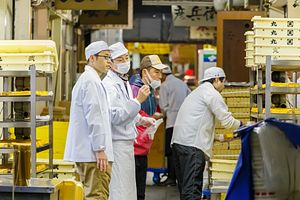Millions of Japanese workers have been abuzz recently with news of a new national holiday. The Diet today passed a new law establishing Mountain Day on August 11, although it won’t officially start until 2016. Japan already has several other holidays based on nature, including those celebrating the spring and fall equinox. Adding one more that enshrines and celebrates Japan’s long mountain chains, which stretch along almost the entirety of the four home islands, doesn’t seem unusual.
Despite Japan’s penchant for honoring its national identity through symbolic festivals and holidays, Mountain Day is likely being introduced for another reason altogether. This will become the country’s sixteenth national holiday, a high number compared to 10 in the U.S. Combined with an average of 10 to 20 vacation days (the latter for workers with six years continuous employment), Japan would seem to have a very progressive approach to the balance between work and life.
Actual numbers however show that this is often not the case, at least not within the structure of most Japanese businesses. A Japanese government survey quoted in the Wall Street Journal shows that the average Japanese worker only takes 8.6 days of personal vacation a year. Japanese politicians and bureaucrats are worried. The Wall Street Journal quotes an LDP member who pushed for the bill through the Diet as saying, “In Japan, there is of course paid vacation, but people don’t take it[.] I hope with Mountain Day, people will be able to take more of their vacation.”
The hope that by giving people an extra national holiday, they will be more inclined to take their personal holidays seems slightly illogical. It doesn’t address the core issue of Japanese people not taking the time that they are legally allowed to have. “Many Japanese people don’t understand,” says Hirokuni Ikezoe, senior researcher at the Japan Institute for Labor Policy and Training, “that paid annual leave is their right.”
Prime Minister Shinzo Abe has made the issue of work-life balance a part of his economic reform package, specifically so that more women can enter the workforce. During his keynote speech at the Organization for Economic Cooperation and Development (OECD) on May 6, Abe pledged: “We will press forward in reviewing the system of labor that gives consideration to the work-life balance, creating a society in which women shine.” He also set a target of women occupying 30 percent of leadership positions in Japanese society by 2020.
The government is beginning to suggest other ways to address the issue of worker fatigue and poor life-work balance by recommending naps. In March, Jiji Press reported a guidance issued by the Ministry of Health, Labor and Welfare suggesting workers take a nap for up to half an hour. While the idea of taking short 10-20 minute naps to improve attention and mood is generally supported by the scientific community, the Jiji article only names one Japanese company (Osaka-based information technology firm Hugo Co.) as having implemented such a policy.
An increase in the percentage of women in the workforce might indeed affect the long hours and fewer days of vacation that most Japanese workers typically experience. There are also certain professions where women still have yet to make any significant inroads. Kyodo News reported yesterday that women currently only represent 7.7 percent of the police force nationwide. However, more people in the workforce may not automatically translate into a better life-work balance, just as increasing national holidays may not spur Japanese people to take more of their vacation days.
The increase in holidays also comes with its own set of problems. As Japanese workers tend to only take off work on national holidays, it causes congestion on roads and trains and drives up the prices of flights and hotels. This problem is especially felt in Japan’s top tourist destinations, a problem that could be further exacerbated as Tokyo was just rated as the world’s most satisfying city for tourists in 2013, according to a Trip Advisor survey printed in the Japan Times.
Japan’s problem with overwork, its knock-on effects, and the government’s attempts to address the issue have been around for decades. While adding an additional holiday may seem worthwhile, as it at least guarantees most people will get another day off, it doesn’t address a bigger issue. For over a generation Japanese people have been working harder to keep their economy treading water, at best. Abe’s planned ascent out of Japan’s economic doldrums promises that Japanese people will experience growth again. Whether that growth encourages Japanese businesses and labor to find a better balance between work and life is a more difficult question to answer.

































